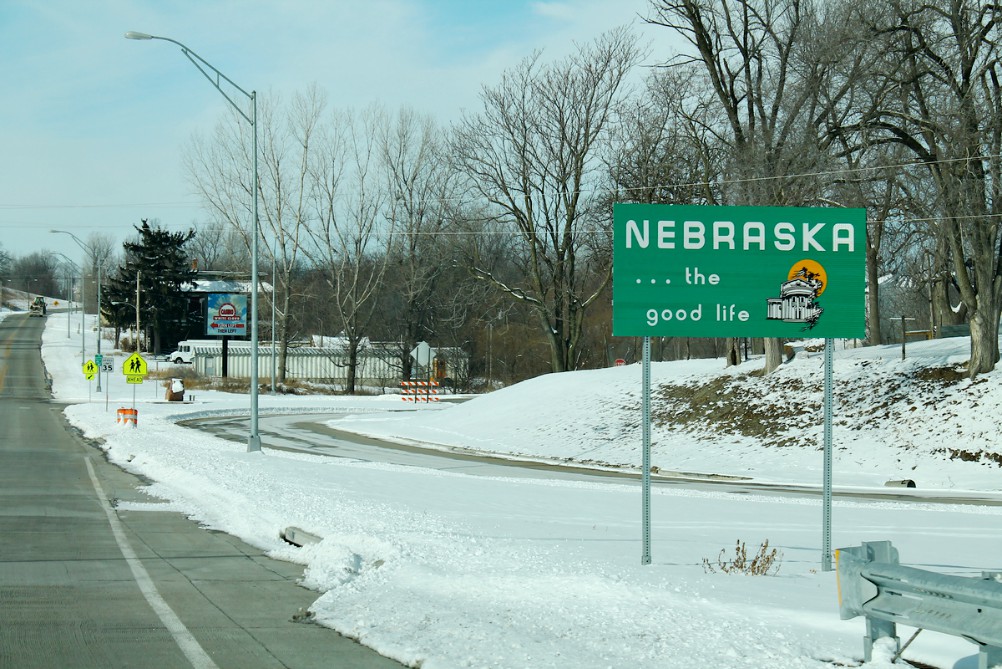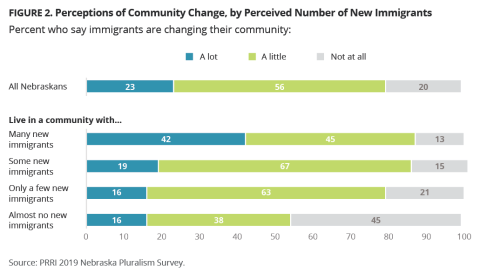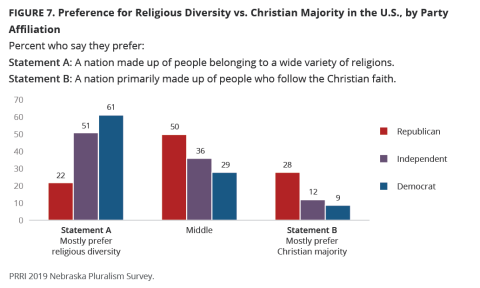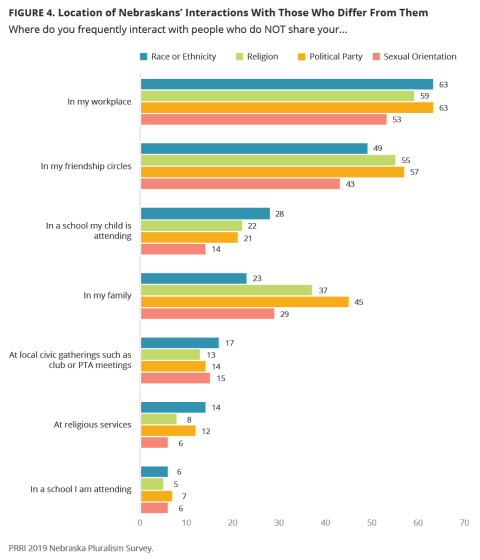
A welcome sign is seen on a highway entering the state of Nebraska. (Wikimedia Commons/formulaone)
Nebraska may be less diverse than the United States as a whole, but it doesn't mean the residents live in a bubble, according to Natalie Jackson, research director for PRRI, a nonprofit and nonpartisan research organization.
PRRI released a Nov. 11 poll of more than 1,300 Nebraskans that shows they are divided about demographic and cultural shifts changing communities, yet optimistic about their ability to work together across racial and religious lines.
Jackson said the results from Nebraska are similar to a national poll released in February that found Americans deeply divided by party on religious and ethnic pluralism.
"Despite Nebraska being a little more Republican, a lot of these results looked pretty similar as far as experiences with diversity and their preferences for a diverse society," she said.
Jackson said there's a perception that red states are going to be much less tolerant, much more clearly conservative in their viewpoints.
"Nebraskans look like average Americans despite being less diverse than the country as a whole," she said.
Jackson said Nebraskans are optimistic about being able to come together to solve problems.
"When you ask about religion and race and ethnicities, Nebraskans are very optimistic that people can come together across religious and racial lines to solve problems," she said. "Where that falls apart is partisanship. We see that throughout the report. When you bring partisanship in, Nebraskans, like the rest of the country, become more skeptical that those partisan divides can be bridged."
Advertisement
Only 45% of Nebraskans have taken action on a civil or political issue. Twenty-two percent sign petitions, but fewer than one in 10 have attended a protest or rally. Two percent of those asked volunteer on presidential campaigns and 1% volunteer for other types of campaigns aside from presidential elections.
Most Nebraskans don't wander far from home. Forty-six percent of Nebraskans live in the communities where they grew up, with only 33% of Americans overall reporting similar situations. More than half — 52% — say they've spent their entire lives in the state and 25% have lived there for 20 or more years.
"Nebraskans are more likely than Americans overall to be born in the U.S. and to live in the community in which they grew up, but they are simultaneously more likely than Americans overall to report that they live in a community with many new immigrants," PRRI CEO Robert Jones noted in a press release. "Like Americans overall, Nebraskans are divided starkly along party lines over the meaning and future implications of these changes."
Living in the same state for a lifetime does not mean Nebraskans aren't impacted by immigration. Twenty-four percent of Nebraskans report that their community has many new immigrants and 37% say their community has at least some new immigrants. This is significantly higher than Americans overall.
Sixty-two percent of Nebraskans support allowing immigrants who were brought illegally to the United States as children to gain legal residency. Democrats support it at 81%, independents at 63% and Republicans at 47%. For Nebraskans who live in a community with a lot of immigrants, they support it at 61% — more likely than those in communities with few immigrants (57%) or almost no immigrants (59%).
"We saw a lot of similarities with Nebraska and the national survey, which is interesting when you think about it because Nebraska is less religiously diverse than the nation and as a whole," said Jackson. "Within Nebraska, we were only able to look at white evangelical Protestants, mainline Protestants, Catholics and unaffiliated."
When asked whether they prefer a Christian majority or religious diversity, white evangelical Protestants are most likely of all religious groups to say they prefer a Christian majority, at 43%, while only 13% prefer a wide range of religious.
Forty-one percent of Catholics prefer a wide range of religions, and 16% prefer a Christian majority. The rest of Catholics — 42% — fall in the middle of the two options.
The religiously unaffiliated are more likely to support religious diversity, at 68%.
"If you look at all Nebraskans, they are 43% [who prefer] a wide variety, 18% [who prefer] mainly Christian," said Jackson.
Preference for religious diversity varies across party lines, with 61% of Democrats being almost three times as likely as Republicans (22%) in preferring religious diversity. Independents prefer religious diversity at 51%. Twenty-eight percent of Republicans prefer to live in a nation with a Christian majority, while 9% of Democrats share the same preference.
Only 15% of Nebraskans say they seldom or never interact with someone who doesn't share their ethnicity. Other differences showed respondents who say they seldom or never interact with someone who doesn't share their political party (15%), religion (19%) or sexual orientation (25%).
Nebraskans who do have some interactions with people of different backgrounds are interacting in the workplace by 63%. Similar to most Americans' experience of diversity, the workplace interactions are more common than any other social gatherings by nearly 15 percentage points, according to the survey.
Polarization drills down to the marriage of children, with 32% of Republicans saying they would be unhappy if their children married someone from the opposite party. At 27%, Nebraska Democrats are less likely than Democrats nationwide (45%) to be unhappy if their child marries a Republican.
"Nebraska Democrats show a little more tolerance toward Republicans than Democrats nationally, and they are more likely to have interactions with people of different parties within their families than Democrats nationally," said Jackson. "This reflects the more Republican-leaning nature of Nebraska. Democrats are realistic that, in a state where the partisan distribution leans against them, it's a real possibility their child could marry a Republican. They seem to have adjusted their expectations accordingly."
Additional findings in the survey saw 58% of Nebraskans mostly believing the state is going in the right direction and 41% think it is on the wrong track.
Belief in the American dream still holds for 54% of Nebraskans, while 37% percent said it was once true, and 9% say it was never true. Politically, 71% of Republicans, 46% of Democrats and 45% of independents in Nebraska say the American dream still holds true.
[Elizabeth A. Elliott is the assistant editor at Enterprise Publishers in Blair, Nebraska. She most recently worked as a staff writer at the Arlington Catholic Herald in Arlington, Virginia.]







